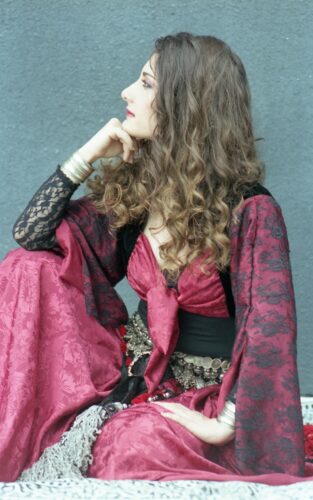Moroccan Dance Live! Presented by Kristina Koutsoudas at Houston Fringe Festival

On November 3rd, Houston-based dancer/choreographer/teacher Kristina Koutsoudas and company will present an evening-length program of contemporary and traditional indigenous Moroccan dance. In a wide-ranging conversation spanning diverse topics, Kristina shed light on her journey as a dancer and choreographer, her inspiration and process in creating this work, and the history of Middle Eastern dance at large.
The dances to be presented at the Houston Fringe Festival include lively Chikaat (Romangi) and Cha’abi (street or village) dances. Derived from the tradition of the traveling shikaat performers of Morocco, these dances combine powerful, subtle, hip movements, expressive gestures, and dynamic expression to create beautiful movements unlike any other. The dances will variously incorporate tambourine work, a tea tray with sweets, meditative and healing movements, incense and candlelight, and improvisation. Read more about the pieces here. Kristina will be joined by soloist Elisheba, who currently teaches and performs in Atlanta, GA.
In addition, the evening’s performance will also include dancers who attended a class series offered by Kristina, which was open to community members and dancers alike. According to Kristina, these classes were intended to uplift and enliven, and to feel accessible to all levels of dancers. She structured the classes to give instruction in different types of movements – hipwork, upper torso work, gestures, and hair/head work – and offered students the opportunity to improvise with these movements to interpret the rhythm. The combinations and patterns created by the students were then incorporated into one of the dance pieces in the presentation.
The roots of the dances to be presented can be traced back to several hundreds of years BCE, according to Kristina, who has learned these art forms from authentic masters across the world and in various settings. She is careful to point out that the ancient art forms have likely evolved to their current forms, as the surviving descriptions from thousands of years past are not definitive, and are open to interpretation. Says Kristina, “These dances were traditionally performed for various occasions, such as war and to invoke fertility; in the contemporary context, descendants of these dances are performed at various public and private celebrations and occasions.”
Kristina’s vast and varied training, as well as her deep dives into the history and origins of these art forms, is evident, and equips her uniquely to craft a rich tapestry of dance for today’s audiences. Kristina speaks fluently and with passion about the history, instrumentation, rhythmic structures, communal spaces, population migrations and so much more, associated with the evolution of these dance forms, and their similarities to various African and Middle Eastern dances and even flamenco.
 When speaking to Kristina about her motivation and process for creating this program, it is immediately evident that she intends the evening to be inclusive, sharing, and participatory. Having traveled extensively to train in dance and learn from authentic teachers, Kristina seeks to present dance as a cultural art to diverse audiences, while empowering women through dance and building a community of dancers and audiences alike. From including class participants in choreography to inviting the audience to partake in the movement, Kristina has designed the evening to be a joyful dialogue, blurring the lines between performer and observer. In her words, she intends to give the audience “the experience of dance as a communal, spiritual expression… a dialogue between performers and the audience that is uplifting, inspiring, and enthusiastic”. She is quick to clarify that any audience participation will be completely voluntary; the intent is to create a sense of communal joy, whether that comes from observing or participating. As she says, “The best ‘knowing’ is to experience”; according to an old Greek proverb, “to dance, one must dance!”
When speaking to Kristina about her motivation and process for creating this program, it is immediately evident that she intends the evening to be inclusive, sharing, and participatory. Having traveled extensively to train in dance and learn from authentic teachers, Kristina seeks to present dance as a cultural art to diverse audiences, while empowering women through dance and building a community of dancers and audiences alike. From including class participants in choreography to inviting the audience to partake in the movement, Kristina has designed the evening to be a joyful dialogue, blurring the lines between performer and observer. In her words, she intends to give the audience “the experience of dance as a communal, spiritual expression… a dialogue between performers and the audience that is uplifting, inspiring, and enthusiastic”. She is quick to clarify that any audience participation will be completely voluntary; the intent is to create a sense of communal joy, whether that comes from observing or participating. As she says, “The best ‘knowing’ is to experience”; according to an old Greek proverb, “to dance, one must dance!”
How to watch: Tickets ($20; general admission) are available at the MATCH website here. This performance is suitable to audiences of all ages, and has a run time of 60 minutes. Seating will begin at 7 pm, and the performance will begin at 7:30 pm.



Recent Comments